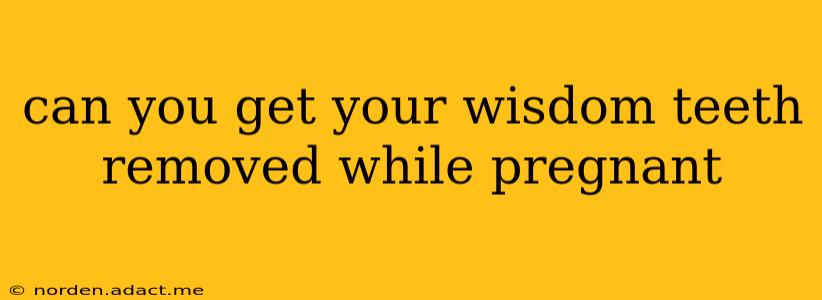Can You Get Your Wisdom Teeth Removed While Pregnant?
The short answer is: generally, no, it's not recommended to have your wisdom teeth removed during pregnancy. While there are rare exceptions, the risks associated with the procedure and anesthesia outweigh the benefits during this delicate time. This decision should always be made in consultation with both your dentist and your obstetrician.
This article will delve deeper into the reasons behind this recommendation, exploring the potential risks and outlining alternative approaches.
What are the Risks of Wisdom Teeth Removal During Pregnancy?
Several factors contribute to the heightened risk associated with wisdom tooth extraction during pregnancy:
-
Infection: The risk of infection after any oral surgery is present, but it's amplified during pregnancy due to a suppressed immune system. An infection could potentially harm the developing fetus. The body's natural response to fighting off infection also requires more energy and resources, potentially impacting the pregnancy itself.
-
Anesthesia: The type and amount of anesthesia used during a wisdom tooth extraction can pose risks to the developing fetus, particularly during the first trimester. The effects on the baby are not fully understood, and caution is warranted. This is a significant factor in most dentists' decisions to postpone the procedure.
-
Radiation: While dental X-rays utilize a low dose of radiation, it's generally recommended to avoid unnecessary X-rays during pregnancy. This is another reason why most dentists will defer the extraction until after delivery.
-
Stress and Pain: The stress and pain associated with surgery and recovery can negatively impact both the mother and the developing baby. The body’s need to cope with this stress can divert resources away from the pregnancy.
-
Medications: Certain pain medications and antibiotics prescribed after the procedure may not be safe during pregnancy. Dentists need to carefully consider this factor and explore alternatives.
When is Wisdom Teeth Removal Acceptable During Pregnancy?
There are extremely rare instances where removing wisdom teeth during pregnancy might be considered. These would typically involve situations where there's a serious and immediate threat to the mother's health, such as:
- Severe infection: A severe infection that poses a significant risk to the mother's overall health might necessitate immediate intervention, even during pregnancy.
- Impacted tooth causing significant pain or other complications: Extreme pain, infection, or the risk of complications from an impacted wisdom tooth may lead to a difficult decision to proceed, but only with extremely careful monitoring and planning by both the dentist and obstetrician.
It's crucial to understand that these are exceptions, not the rule. The decision to proceed would involve a detailed risk-benefit assessment by the medical professionals involved.
What are the Alternatives to Wisdom Teeth Removal During Pregnancy?
The best approach is usually to postpone the procedure until after delivery. In the meantime, your dentist can provide guidance on managing any discomfort or complications associated with your wisdom teeth. This may include:
- Pain management: Over-the-counter pain relievers that are safe during pregnancy, or prescription medications under strict medical supervision.
- Regular monitoring: Close monitoring for any signs of infection or other complications.
- Good oral hygiene: Maintaining excellent oral hygiene practices to minimize the risk of infection.
Should I Wait Until After I Give Birth?
Yes, the overwhelming recommendation from dental and medical professionals is to wait until after you give birth to have your wisdom teeth removed. This minimizes the risks to both you and your baby. Following childbirth, your body will have recovered, and the risks associated with anesthesia and infection will be significantly reduced.
Ultimately, the decision of whether or not to remove wisdom teeth during pregnancy is a highly individual one that requires careful consultation with your dentist and obstetrician. They will weigh the potential risks and benefits in your specific situation and guide you toward the safest and most appropriate course of action.
